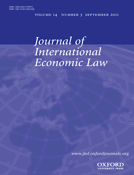-
Views
-
Cite
Cite
Gillian Moon, Fair in Form, But Discriminatory in Operation—WTO Law’s Discriminatory Effects on Human Rights in Developing Countries, Journal of International Economic Law, Volume 14, Issue 3, September 2011, Pages 553–592, https://doi.org/10.1093/jiel/jgr023
Close - Share Icon Share
Abstract
There are many points of intersection between the law of the World Trade Organization and international human rights law. This article looks at one such, where WTO law requires developing countries to introduce measures that may have disproportionately adverse impacts on the human rights of individuals or groups who are protected under human rights law from discrimination. Indirect discrimination of this kind usually occurs because prior discriminatory treatment has created social and economic inequalities that subsequent, apparently neutral—or ‘fair in form’—measures exacerbate. Country studies of Nicaragua and Ghana provide evidence that indirectly discriminatory impacts might occur as a result of the reductions in agricultural tariffs proposed in the Doha Round for developing countries. While laws which have discriminatory effects may be justifiable, discrimination on the basis of race or sex is anathema to human rights law and will be subjected to intense justificational scrutiny. The article scrutinizes the justifiability of the proposed agricultural tariff reductions, concluding that less damaging alternatives are available and could be adopted at the multilateral level. It is argued that the potential discrimination is best dealt with at this level, since it is the law-making level and the discrimination is unlikely to be corrected through domestic, remedial action within developing countries.



